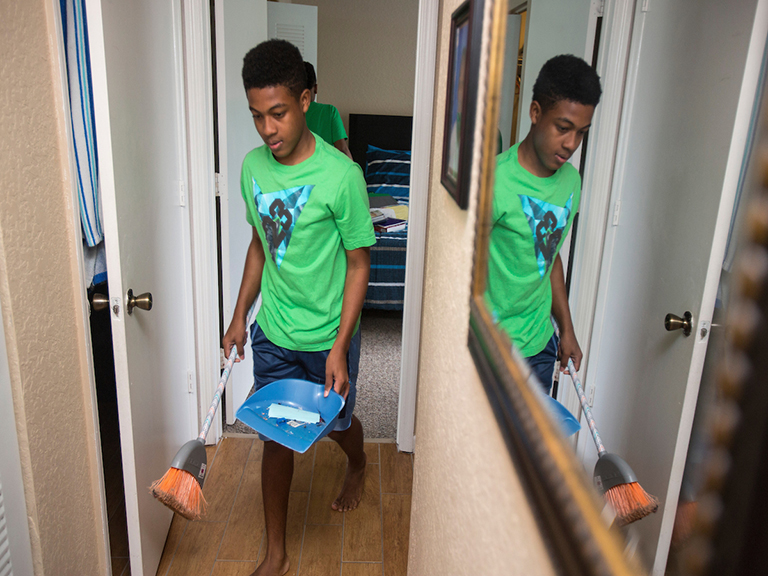- Behavior
- Parenting
House a mess? Here's how to encourage your kids to do chores

In this article, you’ll find answers to questions like:
1. How can I instill chores?2. How early can I start assigning chores?
3. What’s the best strategy?
If you search for “how to get kids to do chores,” the internet will reward you with millions of resources, from expert advice to chore charts.
So how do Palm Beach County parents tackle this negotiation? Mostly, through strategy and a teamwork approach.
1. HOW CAN I INSTILL CHORES?
Jennifer Martinez, a Wellington mother of two daughters and owner of JLM Communications, stands firm. Her daughters are not allowed afterschool or fun activities until they finish their chores. “There are no excuses left,” she says.
Martinez assigns manageable daily chores, such as cleaning the bathroom mirrors, dusting the baseboards, unloading the dishwasher and putting away laundry.“They earn $5 per week if everything is done, and we keep a tally. When they have enough to buy whatever they want, I handle the purchase,” Martinez says. “One daughter is saving to buy a new pair of Air Jordan shoes; the other wants a laptop.”
Lauren Scirrotto, mother of two boys and chief program officer for Center for Child Counseling in Palm Beach Gardens, doesn’t use allowances. Instead, she stresses teamwork.
“In our home, we are a team, and everyone plays a role and contributes. We do use age- and developmentally appropriate tasks for each child,” she says. “My fourth-grader loads the dishwasher, takes out the trash and helps with our pets. My 5-year-old sets the table, puts away his folded laundry and feeds the dog. They know that we all have to do our part to have our home run smoothly and that all the work should not fall on one person. They see myself and my husband equally take care of things around the house too.”
2. HOW EARLY CAN I ASSIGN CHORES?
Children as young as 1 to 3 years old can be taught how to help around the house by mimicking parents' behavior, according a National Public Radio report on the differences in chores among cultures. The report acknowledged that cultural influences can be difficult to duplicate in other cultures and offered tips for American families, such as:
• Don’t make up fake chores for little ones. Give them small duties, such as drying a plastic bowl or stashing away a few toys for a sense of accomplishment and contribution.
• Do chores together so children feel a part of something bigger and instill the sense that family time is a reward.
• Expand what you think your children can do. With patience and time, a child stirring pancake batter can eventually make an entire breakfast.
3. WHAT’S THE BEST STRATEGY?
Josh Kolkana, a father of four and director of Homes of Hope for Place of Hope in Palm Beach Gardens, has a more direct way to encourage his children — something you probably can relate to:
“The single most powerful tool in encouraging them to complete something is using their device as leverage,” he says.
For example, Kolkana suggests suspending phone or gaming privileges until the chores are completed.
SOURCES:• Lauren Scirrotto, chief program officer, Center for Child Counseling
• "How to get your kids to do chores (without resenting it)," National Public Radio, June 9, 2018
• Josh Kolkana, director of Homes of Hope, Place of Hope
You May Also Like
-
- Behavior
- Parenting
- Safety
Teach your high schooler responsibility and independence
Teens can become rebellious as they evolve to full expression and self-sufficiency. So turn everyday conflicts into opportunities to teach them skills that will last a lifetime. He …
Read More -
- Behavior
- Health
- Parenting
Strive for harmonious team with your partner to raise teenagers
Teenagers exerting their independence present unique challenges and carefully watch how you react. So the ways you agree to tackle these issues with your spouse can have a huge imp …
Read More
Related resources
-
- Education
- Parenting
- Things to do
BRIDGES of Palm Beach County
Ten neighborhood hubs help parents raise children healthy, safe and strong
561-740-7017 Website -
- Behavior
- Parenting
Center for Family Services of Palm Beach County
Positive Parenting Program, known as Triple P, offers free seminars and one-on-one guidance to help families improve the parent-child relationship
561-616-1222 Website Email -
- Behavior
- Parenting
Community Partners
Positive Parenting Program, known as Triple P — free seminars and one-on-one guidance to help families improve their parent-child relationships
561-841-3500 Website Email
